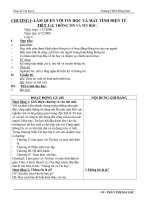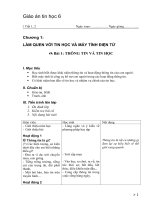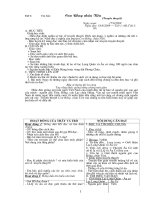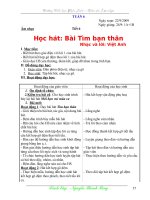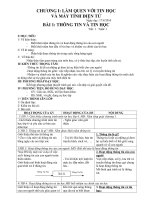6.0.1.2 Class Activity - The road less traveled... - ILM
Bạn đang xem bản rút gọn của tài liệu. Xem và tải ngay bản đầy đủ của tài liệu tại đây (62.26 KB, 2 trang )
Class Activity - The Road Less Traveled…Or Is It? (Instructor
Version – Optional Class Activity)
Instructor Note: Red font color or gray highlights indicate text that appears in the instructor copy only. Optional
activities are designed to enhance understanding and/or to provide additional practice.
Objectives
Explain how network devices use routing tables to direct packets to a destination network.
Background /Scenario
During the upcoming weekend, you decide to visit a schoolmate who is currently at home sick. You know his
street address but you have never been to his town before.
Instead of looking up the address on the map, you decide to take it easy and to simply ask town residents for
directions after you arrive by train.
The citizens you ask for directions are very helpful. However, they all have an interesting habit. Instead of
explaining the entire route to your destination, they all tell you, “Take this road and as soon as you arrive at
the nearest crossroad, ask somebody there again.”
Somewhat bemused at this apparent oddity, you follow these instructions and finally arrive, crossroad by
crossroad, and road by road, at your friend’s house.
Instructor Note: This optional Modeling Activity is not intended to be a graded assignment. Its purpose is to
encourage students to reflect on their perceptions of how a network uses pathways to send and receive data
communications. Facilitation of the discussion should be initiated as a result of this activity.
Reflection
1. Would it have made a significant difference if you were told about the whole route or a larger part of the route
instead of just being directed to the nearest crossroad?
_______________________________________________________________________________________
_______________________________________________________________________________________
It would not really make a difference. The key fact to remember here is that to reach any part of the route
behind the nearest crossroad, we must first reach that crossroad. If residents at each crossroad can be
assumed to know their town well, it is not really helpful to ask about what is beyond the first crossroad as we
must still reach it, and on each crossroad, we will be directed appropriately. Please make the students aware,
however, that congestion can also affect whether an route is better than another to use.
2. Would it have been more helpful to ask about the specific street address or just about the street name?
_______________________________________________________________________________________
_______________________________________________________________________________________
Asking about the street name, omitting the house number, is sufficient. Once we get to the destination street,
we can easily look up the house ourselves. People at crossroads will be able to direct us even without telling
them the exact house number. They do not need to know each and every house in every street – it is
sufficient they know the streets themselves.
3. What would happen if the person you asked for directions did not know where the destination street was or
directed you through an incorrect road?
_______________________________________________________________________________________
_______________________________________________________________________________________
© 2017 Cisco and/or its affiliates. All rights reserved. This document is Cisco Public.
Page 1 of 2
The Road Less Traveled…Or Is It?
In that case, we would be in risk of getting either misrouted and following a longer route to the destination
than necessary, or we may even end up going in circles or getting lost.
4. Assuming that on your way back home, you again choose to ask residents for directions. Is it guaranteed that
you will be directed via the same route you took to get to your friend’s home? Explain your answer.
_______________________________________________________________________________________
_______________________________________________________________________________________
There is no such guarantee. Each person at a crossroad makes an individual and independent choice about
the best path. It is quite possible that if the residents do not have the same knowledge or ideas about the
routes within their town, you would be going back to the train station via a different route.
5. Is it necessary to explain where you depart from when asking directions to an intended destination?
_______________________________________________________________________________________
_______________________________________________________________________________________
Describing where you departed from is not helpful when choosing path towards a destination. It is only the
destination itself that matters when selecting the best route towards it.
Identify elements of the model that map to IT-related content:
Crossroads – Correspond to stops along the way (routers)
Roads – Correspond to interface links between routers
Street – Corresponds to a network
Irrelevancy of house number when asking for the path to the destination street – Corresponds to routers
knowing about networks, not about individual hosts
Asking about the path to destination at each crossroad – Corresponds to path selection performed on
each router
Train station, friend’s house – Corresponds to source and destination
Relevancy of only the destination when asking for a path – Corresponds to destination-based routing
Different possible paths to and from the friend – Correspond to independent routing to and from a
destination
© 2017 Cisco and/or its affiliates. All rights reserved. This document is Cisco Public.
Page 2 of 2

